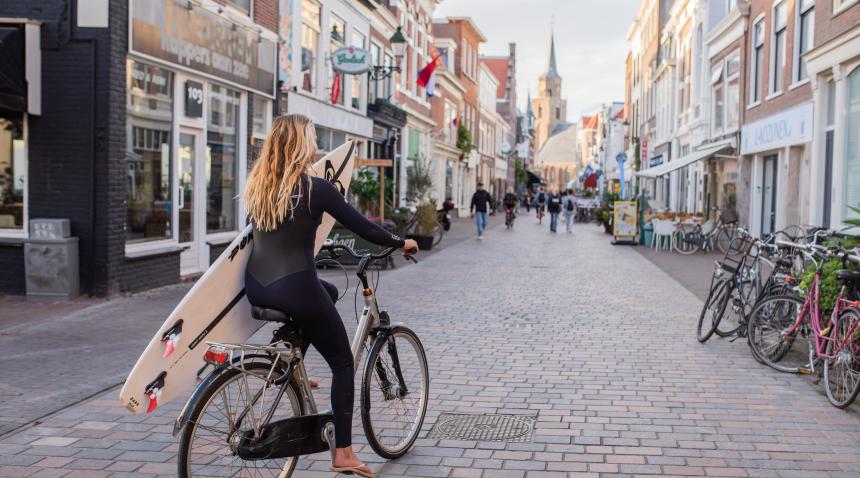
Waste and recycling
When you’re living in The Hague, what do you do with your rubbish? The rules about waste disposal and recycling in the Netherlands may look complicated at first, and breaking them can lead to a fine. But don’t worry, the trash system in The Hague makes it easy to throw away your rubbish in the right way. Learn about the many ways to recycle and find out how to help keep The Hague clean.
Regular Household Waste
Depending on where you live, there are different ways to throw out your rubbish and recycling. In some neighbourhoods, you can leave trash bags on the street on a specific weekday, or in separate ‘wheelie’ trash bins for different kinds of waste. Each kind of rubbish is collected on certain days each week. Search your address on the household waste calendar to see when. And make sure to put the right kind of waste in the right colour bin:
Organic waste – green bin
Paper and cardboard – blue bin
Plastic, metal and drink cartons – orange bin
All remaining waste – grey or black bin
If nothing shows up when you enter your address, you have to put your waste into large storage containers in your neighbourhood, at specific waste collection points. These can be used any day of the week, but be kind to your neighbours and don’t use them between 22:00 and 7:00, to avoid making too much noise.
Separating Your Rubbish Correctly
To avoid a €200 fine, make sure you put each kind of waste in the right place. Some kinds of waste should always be separated from your regular household waste, so they can be recycled: paper, glass, textiles, plastic, tins and drink cartons, electric and electronic appliances, and organic waste and compost (GFT). See how to recycle these below.
You also should never put the following items in your regular household waste:
- bulky waste (grofvuil)
- domestic chemical waste (KCA)
- company waste
- sharp objects or glass in garbage bags (people passing by and garbage collectors could cut themselves)
- loose plastic bags
- boxes with rubbish or other loose garbage
Recycling Collection
The fines for not recycling exist partly to increase how much rubbish is recycled. Recycling helps reduce how much waste goes into landfill, and provides recycled materials to make new products, using less energy. So recycling is a simple way for you to help reduce harm to the environment.
Luckily, most kinds of recyclable waste are collected by The Hague’s municipality. All you have to do is separate things properly:
- Plastic, tins and drink cartons: these should be empty, though they don’t have to be completely clean. Note that only plastic that is packaging material should go here – other items, such as toys, plastic plates, or toothbrushes, should be disposed of in your regular household waste.
- Organic waste (food waste): note that biodegradable plastic is not allowed, as it takes too long to turn into compost.
- Paper: must be dry and clean.
- Glass: don’t use the glass containers between 20:00 and 7:00.
- Textiles: textiles are collected in special containers and at The Hague’s city farms.
Other Ways to Recycle
There are other items that must be recycled rather than be put in your household waste, but that are not collected by the municipality as part of the regular collection.
If you are planning to replace them, you can give broken electronic appliances such as washing machines to the shop where you are buying a new one. When you buy an appliance in the Netherlands, you pay a small ‘disposal tax’. The shop must then take your old appliance. If you’re not buying a new appliance, go to a waste drop-off centre (see below) or throw it out as bulky waste (grofvuil).
Used frying oil can be poured, cold, into a bottle and taken to one of the city farms or a waste drop-off centre. It can be reused as fuel.
But not everything is trash! If you think your appliance can still be fixed, take it to a repair café. Clothes or other items that could still be used by someone else can go to a thrift shop or recycled goods shop (kringloopwinkel) near you.
Waste Drop-off Centres
Some items can be more difficult to throw away and are not collected by the municipality. This might include bulky waste, garden waste, and construction and demolition waste, plus some appliances or used oil. Take these to a waste drop-off centre. To get inside, you will need an ‘afvalpas’, which each household can get for free.
Beyond The Hague
Things may work a little differently outside The Hague. Waste management in Delft, Leidschendam-Voorburg and Rijswijk is handled by Avalex. The Avalex website also offers a handy guide on how to separate your waste, general FAQs, and rules for disposing bulky waste. If you live in Delft, there are many options to reduce your ecological footprint by recycling your garbage.
About to move or still settling in? Learn more about your neighbourhood in or around The Hague, or about utilities in your home. If you’re still decorating or looking for furniture, find out how to move your belongings or where to buy new furniture.



